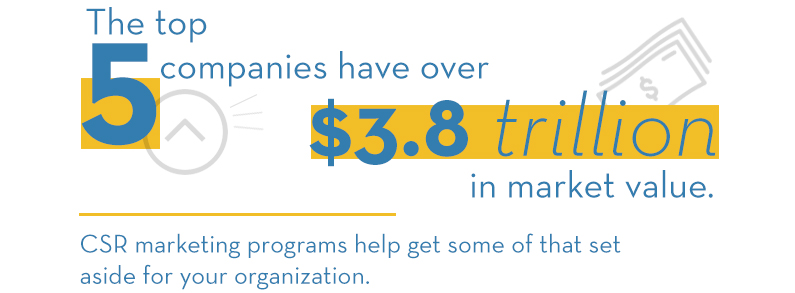CSR Marketing: How to Leverage CSR Programs to Build Corporate Sponsors
Whether you’re hosting a black-tie gala or bringing volunteers in to pick up trash, as a nonprofit you have one goal in mind: supporting your charitable cause. While the end goal usually has something to do with financial donations, it doesn’t always start out that way.
Take CSR initiatives for example. Typically, a Corporate Social Responsibility (CSR) program starts with volunteer work or a match-in-kind donation before it moves towards a more established financial sponsorship program.
The most straightforward way to leverage CSR programs to build corporate sponsors and financial donors is through a targeted marketing program.
Wait, What is CSR?
In 2017 alone, corporations gave nearly $21 billion to charities across the country, according to Giving USA. This ‘Corporate Social Responsibility’, or CSR, has become a foundational aspect for businesses in the past few years. There are a few reasons for this.
- The general public is now realizing how great the global need for charitable endeavors is, as well as how much wealth the largest corporations have amassed. The public has asked businesses to help support the global economy on a different level.
- The rise of Millennials and Generation Z workers have shifted what it means to be a ‘socially responsible’ company. These workers want to work for (and buy goods from) philanthropic organizations.
- Consumers have actively begun looking for companies who are ‘good corporate citizens’ to patronize and help grow. In fact, 55% of consumers will pay more for products and services provided by socially responsible companies.
Corporations have begun to take notice, which means companies are actively looking for nonprofit partners to help grow their CSR footprint.
For nonprofits, this is a huge opportunity to grow and expand your footprint, as well as increase donations and outreach efforts. So how can nonprofits and corporations come together? It’s all about the CSR marketing strategy.
A good CSR marketing strategy is important because…
Corporate partners, and the employees that work there, can become lifetime sponsors and donors if treated right. Marketing and promoting CSR initiatives create meaningful relationships for everyone involved on both sides of the aisle.
We’ve already talked about a few reasons why corporations become involved in CSR marketing programs. All of these reasons have to do with boosting company reputation and gaining attention.
Publicly recognizing your corporate sponsors, thanking them for their support, and highlighting their charitable efforts can go a long way in delivering them the ‘social attention’ they expect from the partnership.
If you’ve established a strong CSR program with different corporate partners who share the same values and mission as your organization, you can turn this community into a unique marketing opportunity:
- Connect corporate partners with each other, promote story-sharing and collaboration, and build a platform for engagement.
- Highlight this specific community as a whole for maximum acknowledgment and recognition.
Move Beyond Digital Dependence
Nonprofits have followed in the footprints of nearly every other industry and have become hugely reliant on social media and digital marketing to push campaigns forward.
While digital marketing isa must-have to push your CSR pro gram forward, there are other ways to go beyond digital to make a huge impact:
- Leverage board members, top donors, or partner advocates. Start a speakers bureau to share your message and mission with the local community.
- Go back to the basics and network! Attend meetings in the community and talk about your work and the various ways corporations and individuals can become involved.
- Take advantage of free press. Send out press releases and media announcements highlighting projects, events, and programs with good results.
- Share partner stories. Devote a section of your website or social page to share stories directly from your corporate partners about why they got involved with your organization.
Don’t Sleep on Reciprocal Marketing!
Reciprocal marketing, also known as joint marketing, is a critical aspect of a CSR program. This involves leveraging both your nonprofit and your corporate partner brand to increase awareness. Having a detailed reciprocal marketing program in place establishes credibility and shows potential corporate partners that this isn’t your first rodeo.
If your nonprofit is working in a corporate setting, you need to add some sort of business acumen to your pitches, and reciprocal marketing is how you get there. Highlight every opportunity, campaign idea, or contact that can help get your name and your corporate partner’s name back into the community — from the traditional channels mentioned above to social media, events, and more.
Wrapping Up!
Jump-start your CSR marketing initiatives to increase corporate sponsors and grow financial donations. Check out these additional resources:


